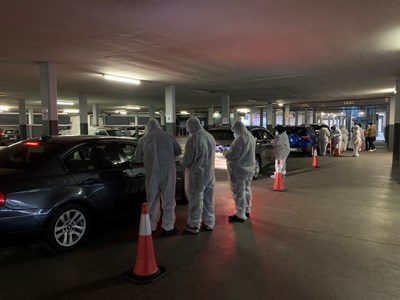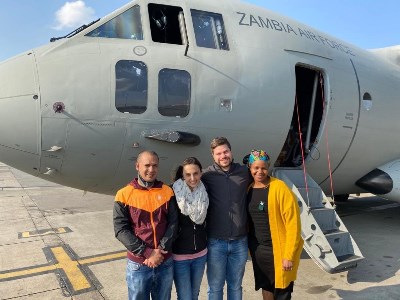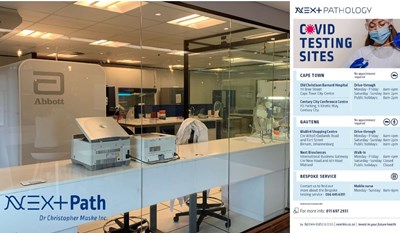You are here
From Cord Blood Bank to COVID Testing Lab: Agility in a time of crisis
In March of last year, after the first case of SARS-COVID-19 (Covid) was reported in South Africa, Next Biosciences was approached by the country’s largest hospital group to assist with healthcare worker testing, as the hospital pathology labs were swamped with long turnaround times.
On the 26th of March, the day that South Africa went into national lockdown, we decided we needed to help. Because we had built a robust business platform for optionality, we went from ideation to validation within a record time of 2 weeks in setting up a PCR Covid Testing Lab.
We processed our first sample on the Easter weekend and since then, we have tested tens of thousands of frontline workers, with results in less than 24 hours, mostly same day.
Our quick turnaround times led to an increase in demand for our testing services from the public, but the bottleneck was the frontline in getting people swabbed, as only healthcare workers could take a nasal or throat swab.
 This resulted in us opening a drive-through testing station in Johannesburg to ensure patients could get swabbed. As the 1st wave had just hit South Africa, we never had the luxury of time, and in 5-days we found a site, negotiated a lease, hired staff, established protocols, and launched! There was no time to trial anything or to ease into operations – this was a classic case of building the plane whilst it was taking off!
This resulted in us opening a drive-through testing station in Johannesburg to ensure patients could get swabbed. As the 1st wave had just hit South Africa, we never had the luxury of time, and in 5-days we found a site, negotiated a lease, hired staff, established protocols, and launched! There was no time to trial anything or to ease into operations – this was a classic case of building the plane whilst it was taking off!
Thereafter we were approached to setup a Covid testing lab for the Zambian Ministry of Health at their new hospital in Lusaka. Only catch was that they needed it done in 2-3 weeks. We said absolutely! We had done it before and could do it again. What we hadn’t however considered, was getting the lab equipment & consumables to Zambia, as well as our staff for set-up and training, during this time of embargo on international flights and quarantining.
 At the very last minute the Zambian Government agreed to send their air force jet to pick up the lab equipment and our staff. We were given 16 hours’ notice in which to ensure all the required equipment was cleared, as well as our staff’s travel documents. Our staff had to pack for an indefinite time, as we had no idea when we would be able to get them back home again! It turned out 3 out of the 4 staff had never flown, so their debut flight was in a real cargo plane as cargo!
At the very last minute the Zambian Government agreed to send their air force jet to pick up the lab equipment and our staff. We were given 16 hours’ notice in which to ensure all the required equipment was cleared, as well as our staff’s travel documents. Our staff had to pack for an indefinite time, as we had no idea when we would be able to get them back home again! It turned out 3 out of the 4 staff had never flown, so their debut flight was in a real cargo plane as cargo!
They spent the month of September in Zambia setting up the lab and training new staff before handing over the lab to the Minister of Health, which luckily coincided with the borders opening up and being able to fly home.
We were just catching our breath, when all of a sudden, early in December our grade 12 student “matrics” (ie high school seniors), who had been celebrating the end of their schooling with their annual rage party, returned home from what landed up being a super spreader event in which 9 out of 10 tested positive. This was the start of the 2nd wave and the emergence of the new South African variant 501Y.V2 which caused havoc and spread like wildfire during our holiday season.
South Africa’s largest insurer reached out to us and asked that we please set-up 2 drive through testing sites in Cape Town to ensure additional resources for testing could be provided during the holiday season. We had 2 weeks to find sites, hire additional staff, and train them. As the virus doesn’t take a holiday, many of our staff had to cancel their holidays and worked every day, including weekends and public holidays (sometimes up to 12 hours a day with no rest) to ensure that the huge demand for testing was met.
As quickly as the second wave started it ended just as abruptly.
And thanks to the fact that a local clinical trial showed that the Oxford-AstraZeneca vaccine is not effective against the variant 501Y.V2, our country decided against using the 1 million doses of that vaccine it had secured. To date, only about 250K healthcare workers in South Africa have been vaccinated with the Johnson & Johnson vaccine, as part of a clinical trial.
We are now in discussions about providing vaccination at our drive through centres, once a suitable vaccine is procured.
Today we employ over 100 people in our Covid testing operations and it won’t be long before we surpass 100,000 tests.
 At Next Biosciences we embrace challenges and change. This pandemic has allowed us to deliver on our belief of “Anything is Possible” which is achieved through our culture of agility and adaptability.
At Next Biosciences we embrace challenges and change. This pandemic has allowed us to deliver on our belief of “Anything is Possible” which is achieved through our culture of agility and adaptability.
Crises facilitate change and one of the few bright spots of the coronavirus pandemic has been an acceleration of scientific innovation. Science has chalked up an impressive list of achievements, from sequencing the Covid genome in record time, identifying Covid treatments which have saved hundreds of thousands of lives, to creating some of the world’s largest and most revealing patient studies and developing many new cheap and effective vaccines that are being deployed globally at scale.
This response provides a potent illustration of the value of collaboration and giving the world a common unifying purpose - something for us all to work towards solving together.
We are very privileged to be playing a small part.



